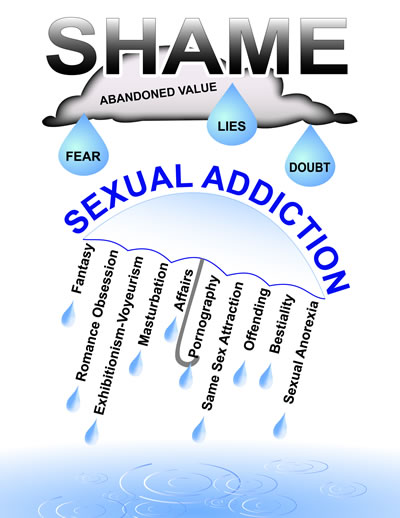What is a “sexual addiction?” Is there really such a thing?
The answer is a resounding “Yes.” And it is very, very common.
In fact, it is pandemic.
All addictions and compulsions are unconscious attempts to sedate or control our experience in order to exit or distract ourselves from uncomfortable feelings and thoughts. What has been referred to as “sex addiction” is no different. Since form is always secondary to content or substance, addiction to sex is usually not really about sex at all. It is almost always more about fear, anger, a sense of powerlessness or loneliness and the resulting rage, shame, guilt, and sadness.
It is, as are all addictions, a habitual reaction to, and a concomitant effort to escape from those feelings, together with a sense of worthlessness and an experience of disconnection from others and from God, Spirit or whatever you call your Higher Power. Sexual addiction is a habitual pattern of seeking connection, safety, and comfort in maladaptive ways. In this respect, it is no different, from addictions to food, alcohol and drugs, gambling, compulsive shopping or spending, and even excessive working habits (workaholism).
Sexual addiction occurs when the sexual experience has become the driving force of a person’s whole life to the detriment of their health, partner, children, friends or their job. Sex addicts are people who have lost the ability to really choose the when, where, why and with whom they wish to be sexual.
With sexual and pornography addiction, the addict will turn to the illusionary world of sex and fantasy. Escape from the real world brings temporary relief but escaping too often solidifies a habit and so escape eventually becomes addictive.
This is similar to how an addiction to alcohol or drugs masks the underlying pain of feeling hurt, betrayed, worried or truly lonely. The main issue of pornography and sex addiction is not the need for more sex, rather, it is to control and avoid deep shame, often unconscious, and relational pain… It can be the addict’s attempt to avoid the pain often caused by genuine intimacy.
The sex addict is essentially creating a false replacement relationship with someone or something that can be controlled and manipulated; such as a picture, a video or a prostitute.
Sexually addictive or compulsive thoughts and behavior engage primitive and very powerful parts of the brain and result in the release of dopamine, a neurotransmitter that makes us feel good. Sexual fantasy is, thus, one of the quickest and most insidious “highs” that the human being can obtain.
Our limbic systems are designed to protect us from harm, and thus the so-called “fight or flight” response is the body’s automatic reaction to danger. For many, but not all “sex addicts”, the limbic system has learned, often at an early age — usually in adolescents or pre-adolescence — that sexual arousal is an emotional antidote to feelings of fear, sadness, even rage. And thus the neurotransmitter’s signals become “crossed”, equating the sexual “high” that comes from the rush of the neurotransmitter dopamine, with the sense of safety from a perceived danger, often a chaotic, neglectful or even a physical or sexually abusive childhood environment. These associative neuronal links are strong and very powerful, making it a challenge to undo them.
It has been said that sexually compulsive thoughts or behaviors result in neuronal changes in the brain quicker than does cocaine. This is one of the reasons that what is referred to as sex addiction is one of, if not the most, pervasive and understated addictions of our times. Another reason is the advent of the internet together with its ease and anonymity.
On another level, it can be said that not all individuals exposed to a frightening, powerless, or chaotic childhood or adolescence will develop an addiction. Some have more of a genetic propensity than others to do so. What determines who will and who will not be so predisposed? One possible answer is the self-esteem of the individual. This, as well, is often caused by the lack of a safe and loving home environment with adequate affirmation and unconditional love. We are not bashing or blaming parents here for generally speaking most if not all parents do the best they can with what they have to work with. That is, their own “inner child” can only love and provide for their children to the extent that they have healed their own childhood wounds. Thus, it is fair to say that virtually all addictions — including sex addiction — also have their roots in a sense of unworthiness and lack of connectedness.
The manifestations of addictions are different, but the common thread running through all addictions is the underlying sense of emptiness, a perceived void which yearns to be filled. Thus, a third reason for the pandemic proportions of the sexual addiction over other addictions is that the “false intimacy” of sexually compulsive or addictive behavior or fantasy comes closer to simulating human connectedness.
Sexual addiction and compulsions often manifest in excessive and/or loveless sexual relationships, extramarital affairs, and in many forms of “acting out” behaviors. These can include visits with prostitutes and internet activity all designed to engage the mind in sexual or erotic fantasy, including the use of pornography and chat rooms.
[box type=”info”] What has been referred to as “love addiction” is closely related but involves more of the addiction to the fantasy of a love object or romanticizing, rather than to the sexual object or sexualizing. Love addiction is also rampant but there are significant differences. In order to stay on task, love addiction will not be addressed here.[/box]
Pingback: Sexual Addiction: Understanding It and How to Treat It - The Infidelity Recovery Institute